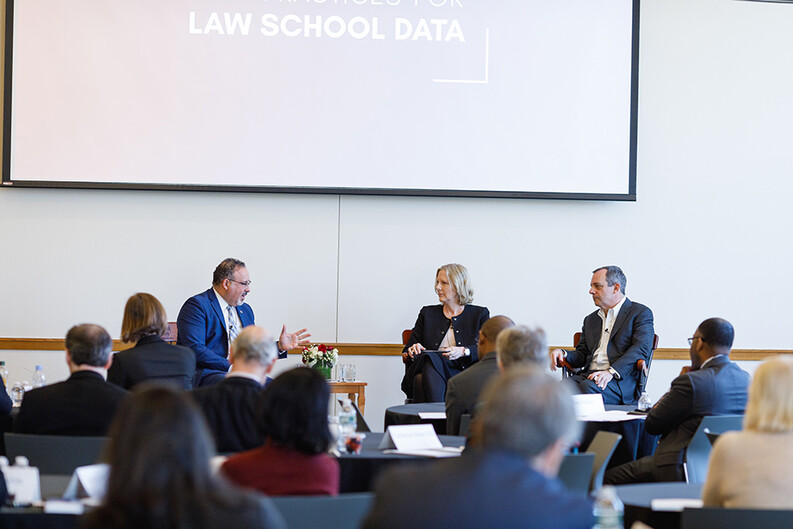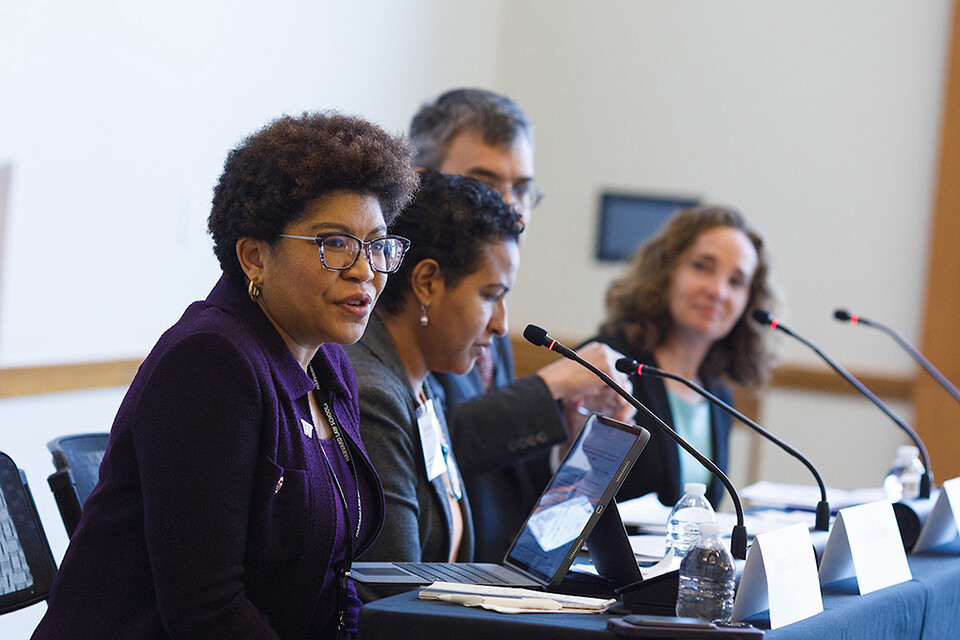Education Secretary Cardona and Expert Panelists Discuss a Future Beyond Rankings

Yale and Harvard law school convened deans and education experts from across the country on March 1 to discuss the types of data that applicants need to make informed decisions about their legal education and what a future beyond the U.S. News & World Report rankings should be.
U.S. Secretary of Education Miguel Cardona opened the one-day conference — attended by representatives from 108 law schools — with a bold keynote address calling on university leaders to start focusing “on what truly matters — delivering value and upward mobility.”
“Together, we can reimagine a new culture in higher education, one that values equity and inclusivity over privilege and selectivity,” Sec. Cardona said at the conference, which included three panel discussions and a closing address from the U.S. Undersecretary of Education, James Kvaal. “Together, we will reimagine what it means to be excellent.”
READ SECRETARY CARDONA'S FULL REMARKS
“Together, we can reimagine a new culture in higher education, one that values equity and inclusivity over privilege and selectivity.”
—U.S. Secretary of Education Miguel Cardona
In November, Yale Law School Dean Heather K. Gerken announced the school would no longer submit data to the annual U.S. News & World Report law school rankings, making it the first law school to decide against participating. Since that announcement, more than 25% of ranked law schools and more than a dozen top medical schools have followed Yale Law School’s lead, sparking a national conversation across higher education about the value of rankings and ways to provide accessible data to students that better reflect the core values of higher education.
In his opening address, Sec. Cardona acknowledged that the field of higher education has reached an inflection point in its disavowal of the rankings, saying that the time of “worshiping at the false altar of U.S. News and World Report” has ended, and that higher education needs “a system that’s inclusive, that delivers value, and that produces equitable outcomes.”
While the movement to abandon the rankings has largely been constrained to graduate institutions, Sec. Cardona urged action across all of higher education. Pointing to Colorado College — a liberal arts school in Colorado Springs that withdrew earlier this week from the U.S. News rankings — Cardona encouraged leaders in the field to “tell [their] colleagues across higher education that they set the agenda, not some for-profit magazine.”
This sentiment was echoed by Dean Gerken, who began the conference by noting how the goal of the panels were “not just how to make choosing law school easier and more transparent for prospective students, but to refocus the conversation on the values of the profession and the future of legal education.”
“For too long we have been cabined by a ranking system that tries to squeeze what cannot be measured into a system that has an impossibly wide range of institutions inside of it,” said Gerken. “I believe that the results have been damaging to the future of legal education and to the future of our profession.”
The conference's first panel discussion focused on “Framing the Issue: Data, Consumers, and Incentives,” and featured Deidré Keller (Dean and Professor of Law, Florida Agricultural and Mechanical University), Risa Goluboff ’00 (Dean and Professor of Law, University of Virginia School of Law), Tamara Lawson (Dean and Professor of Law, University of Washington School of Law), and Christopher Norio Avery (Professor of Public Policy, Harvard Kennedy School).
To kick off the first session, Dean Lawson called out the “outdated ranking systems” for not “doing anything to measure schools that do more with less.” Dean Lawson went on to highlight the American Bar Association’s 509 disclosure reports as a valuable resource for prospective law students as well as a range of other sources of important information. She critiqued U.S. News for disregarding this readily available, regulated, and consistent source of data.
“The American Bar Association actively holds every law school accountable on criteria and data that is publicly available and transparent,” she said.
“For too long we have been cabined by a ranking system that tries to squeeze what cannot be measured into a system that has an impossibly wide range of institutions inside of it.”
—Yale Law School Dean Heather K. Gerken
Dean Keller joined Dean Lawson in critiquing U.S. News’ methodology — noting that the magazine’s attempt to distill law schools into one number is a fruitless exercise, producing “fraudulent numbers.”
Brainstorming which data points should be emphasized in future rankings, Dean Keller stressed the importance of need-based scholarships, stating that “if your goal is a profession that is accessible to all, then need-based aid is fundamental to that goal.” Many leaders, including Dean Gerken, have criticized the U.S. News methodology for disincentivizing need-based aid.
The second panel, “Pre-Law: What Students Are Looking For, a View from the Colleges,” honed in on the undergraduate pre-law experience, with a panel discussion between Tina Coco (Pre-Law Advisor, Baruch Collge–CUNY), Miriam Ingber (Associate Dean of Admissions & Financial Aid, Yale Law School), Kristi Jobson (Associate Dean for Admissions and Chief Admissions Officer, Harvard Law School), Julian Miller (Director of the Pre-Law Program, Tougaloo College), Erin Reichelt (Associate Director for Pre-Law Services, University of Minnesota), and Carol Riddock (Director of Pre-Law Advising, Emory University).
The panel discussed the questions and concerns pre-law students have and how law schools can help make information easier to digest while empowering students to find the right school for them. Reichelt warned that undergraduate students have taken to relying on the U.S. News & World Report “as gospel,” stating that “... if School X is ranked 13th and School Y is ranked 20th — students will apply to the 13th-ranked school rather than the 20th-ranked school, even if the 20th-ranked school is more in the market that they want to be in.”
Moving forward, the panel noted the importance of providing students with clear, accurate, and easy-to-understand data, and suggested that law schools publish this data front and center on their websites to provide prospective students with all the information they need to make an informed decision.
Session three of the conference, “Looking to the Future: What Students Need to Know,” featured Catherine Bond Hill (Former President, Vassar College and Managing Director of Ithaka S+R), Bridget Terry Long (Dean and Saris Professor of Education and Economics, Harvard Graduate School of Education), Dayna Bowen Matthew (Dean and Professor of Law, George Washington University Law School), Peter B. “Bo” Rutledge (Dean, University of Georgia School of Law), and Sudha Setty (Dean and Professor of Law, CUNY School of Law).

Panelists discussed best practices for a new ranking system — rethinking how academia defines “excellence” and “merit” in a way that adheres to the core values of the legal profession. Hill talked about how U.S. News often talks about transparency, “yet they don’t divulge their methodology.” Hill acknowledged that for-profit rankings companies are unlikely to disappear, but said she hoped leaders in the field could find a new way forward with a system that gets students the information they need while also supporting “deans and schools as they work to serve their missions and contribute to the public good.”
The group reflected on ways law schools can build on the strong foundation that is already in place to provide data that helps students differentiate between their top schools without creating harmful disincentives for higher education institutions. Dean Setty closed the session by asking the room, “What are we trying to do when we send these students into the world? How do we create a ranking system that captures these core values with integrity, is not influenced by a for-profit outlet, and that is easily digestible for prospective students?”
To conclude the conference, U.S. Undersecretary of Education Kvaal spoke about the ways in which the Biden administration is working on some of the most pressing issues in higher education — from affordability to graduate rates — and reflected on the importance of bringing higher education leaders together to brainstorm, communicate, and chart a better path forward.
“The U.S. News rankings epitomize a value system that rewards selectivity. It rewards higher cost institutions, gives heavy weight to reputation, and speaks to the idea that there is only one kind of excellence,” Kvaal said. “U.S. News is a bit of a prisoner’s dilemma, and the leadership of Dean Manning and Dean Gerken, and all of you who have followed in their footsteps, can change what we consider quality in higher education.”


